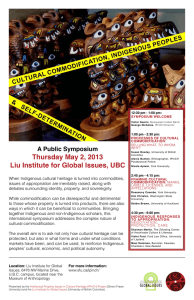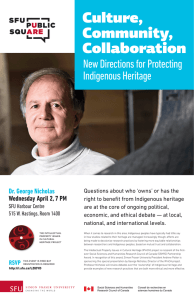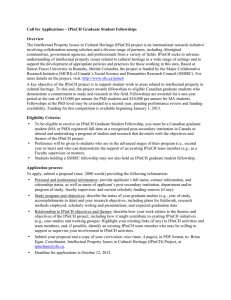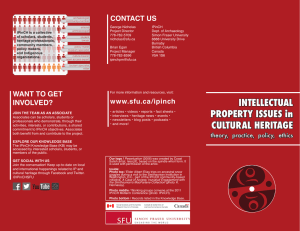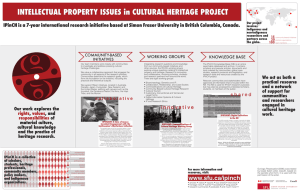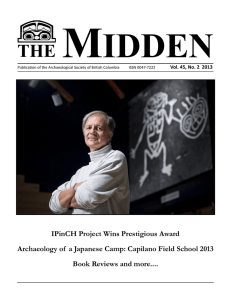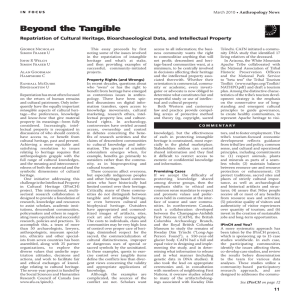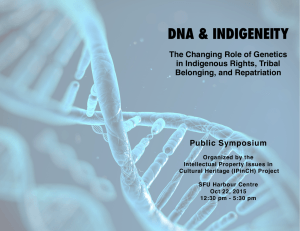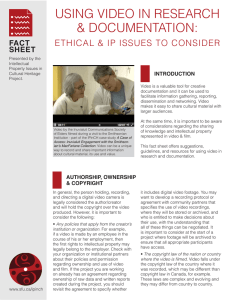IPinCH Intellectual Property Issues in Cultural Heritage:
advertisement
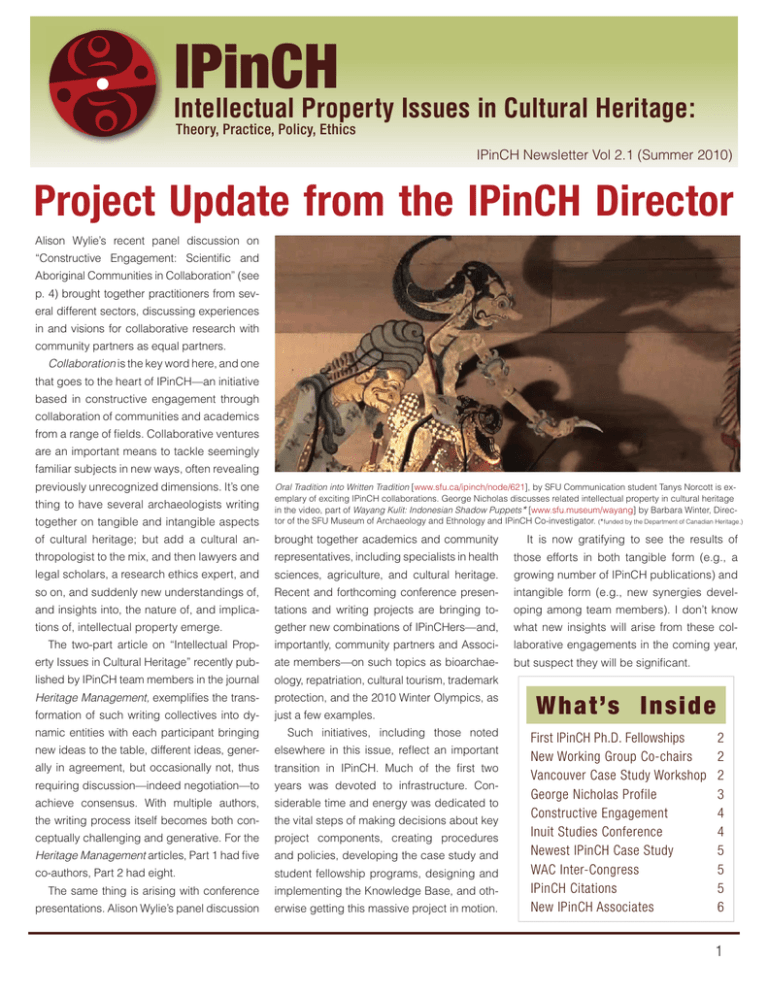
IPinCH Intellectual Property Issues in Cultural Heritage: Theory, Practice, Policy, Ethics IPinCH Newsletter Vol 2.1 (Summer 2010) Project Update from the IPinCH Director Alison Wylie’s recent panel discussion on “Constructive Engagement: Scientific and Aboriginal Communities in Collaboration” (see p. 4) brought together practitioners from several different sectors, discussing experiences in and visions for collaborative research with community partners as equal partners. Collaboration is the key word here, and one that goes to the heart of IPinCH—an initiative based in constructive engagement through collaboration of communities and academics from a range of fields. Collaborative ventures are an important means to tackle seemingly familiar subjects in new ways, often revealing previously unrecognized dimensions. It’s one together on tangible and intangible aspects Oral Tradition into Written Tradition [www.sfu.ca/ipinch/node/621], by SFU Communication student Tanys Norcott is exemplary of exciting IPinCH collaborations. George Nicholas discusses related intellectual property in cultural heritage in the video, part of Wayang Kulit: Indonesian Shadow Puppets* [www.sfu.museum/wayang] by Barbara Winter, Director of the SFU Museum of Archaeology and Ethnology and IPinCH Co-investigator. (*funded by the Department of Canadian Heritage.) of cultural heritage; but add a cultural an- brought together academics and community It is now gratifying to see the results of thropologist to the mix, and then lawyers and representatives, including specialists in health those efforts in both tangible form (e.g., a legal scholars, a research ethics expert, and sciences, agriculture, and cultural heritage. growing number of IPinCH publications) and so on, and suddenly new understandings of, Recent and forthcoming conference presen- intangible form (e.g., new synergies devel- and insights into, the nature of, and implica- tations and writing projects are bringing to- oping among team members). I don’t know tions of, intellectual property emerge. gether new combinations of IPinCHers—and, what new insights will arise from these col- thing to have several archaeologists writing The two-part article on “Intellectual Prop- importantly, community partners and Associ- laborative engagements in the coming year, erty Issues in Cultural Heritage” recently pub- ate members—on such topics as bioarchae- but suspect they will be significant. lished by IPinCH team members in the journal ology, repatriation, cultural tourism, trademark Heritage Management, exemplifies the trans- protection, and the 2010 Winter Olympics, as formation of such writing collectives into dy- just a few examples. namic entities with each participant bringing Such initiatives, including those noted new ideas to the table, different ideas, gener- elsewhere in this issue, reflect an important ally in agreement, but occasionally not, thus transition in IPinCH. Much of the first two requiring discussion—indeed negotiation—to years was devoted to infrastructure. Con- achieve consensus. With multiple authors, siderable time and energy was dedicated to the writing process itself becomes both con- the vital steps of making decisions about key ceptually challenging and generative. For the project components, creating procedures Heritage Management articles, Part 1 had five and policies, developing the case study and co-authors, Part 2 had eight. student fellowship programs, designing and The same thing is arising with conference implementing the Knowledge Base, and oth- presentations. Alison Wylie’s panel discussion erwise getting this massive project in motion. First IPinCH Ph.D. Fellowships New Working Group Co-chairs Vancouver Case Study Workshop George Nicholas Profile Constructive Engagement Inuit Studies Conference Newest IPinCH Case Study WAC Inter-Congress IPinCH Citations New IPinCH Associates 2 2 2 3 4 4 5 5 5 6 1 IPinCH Awards our First Two Ph.D. Fellowships Our first two IPinCH Graduate Student Fellows illustrate the diversity of scholarship and endeavour encompassed by our project. Awarded our first Graduate Student Fellow- Our second IPinCH Graduate Student ship, Michael Klassen is an SFU Archaeol- Fellow, UBC Anthropology Ph.D. can- ogy Ph.D. candidate whose dissertation didate Solen Roth, is engaged in re- examines the engagement of the non-treaty search on Northwest Coast giftware, St’át’imc and Nlaka’pamux nations of Brit- which lies at the interface of the ma- ish Columbia in archaeological theory and terial expressions of intellectual prop- heritage stewardship, and their perspec- erty with both Indigenous and West- tives on both tangible and intangible prop- ern cultural heritage values. This fall, erties. Michael’s Ph.D. supervisor, Eldon Solen will analyze the data she gath- Yellowhorn, is an IPinCH co-investigator, as are the other mem- ered before, during and after the Vancouver 2010 Olympics, bers of his committee, George Nicholas and John Welch. Michael and then complete her dissertation. Her Ph.D. committee co- will be working with the Mookaakin Foundation of the Blood Tribe, supervisors are Dr. Jennifer Kramer and Dr. Anthony Shelton. Dorothy First Rider, and IPinCH Steering Committee member Cath- Solen has posted a thought-provoking IPinCH Student Blog erine Bell on our Case Study, Kainisinni: Protection and Inclusion of entry on a recent seminar at the Otsego Institute of the Fenimore Blackfoot Knowledge and Principles in Government Consultations Af- Art Museum in Cooperstown, NY. It can be found on the IPinCH fecting our Cultural Heritage. Michael has years of experience work- homepage in ‘Blogs’ under the tab ‘Outputs & Resources’: ing with the Blood Tribe in other contexts. www.sfu.ca/ipinch/node/638. Two Team Members Shoulder New Roles as Working Group Co-Chairs We are pleased to announce two new co- previous Co-chair, Jane Anderson, stepped roundtable on “Indigeneity and Intellectual chairs. Solen Roth has accepted Co-chair down to become our IPinCH Project Ethnog- Property in Transnational Policy-Making” at Sven Ouzman’s invitation to join him in rapher. the University of York’s Centre for Public Pol- this role for the Commodifications of the IPinCH Associate Patricia Goff is the new icy and Law in Toronto, Canada. Exploring Past? group. Team members can read the Co-chair of the Working Group on Custom- the political economy of traditional knowl- thoughtful story she submitted as the “fee” to ary, Conventional and Vernacular Legal edge, Patricia is currently studying the work join the group when logged into the IPinCH Forms. Stepping in for Graham Dutfield, who of the World Intellectual Property Organiza- website at: www.sfu.ca/ipinch/node/633 (or regretfully finds himself over-committed, Pa- tion’s Intergovernmental Committee on In- go to ‘Working Groups’ in the left menu, and tricia has been working with Co-chair Rose- tellectual Property and Genetic Resources, select Commodifications of the Past?). The mary Coombe in organizing a forthcoming Traditional Knowledge and Folklore. Vancouver-area Case Study Workshop October 15–16, 2010 IPinCH wants to make a positive difference at the community in the Vancouver area, October 15–16th, 2010. The agenda, be- level, in the academic domain, and for our stakeholders. Accom- ing developed with participant input, is designed foremost to meet plishing this requires learning about the aspirations and expec- the needs of the case study teams and participating communities. tations of the communities IPinCH works with, while at the same The workshop will allow each Community-based Initiative/Case time encouraging communities to engage not just with academ- Study team to provide a brief overview of work in progress, open- ics, but also with each other. ing topics for discussion. There will also be a discussion circle Sharing communities’ experiences relating both to intellectual around topics to be addressed in our Field Guide to Community- property issues in cultural heritage and to working with IPinCH based Participatory Research in Cultural Heritage (working title). will be the focus of a two-day workshop for university research- The Working Group on Collaboration, Relationships and Case ers, community co-developers, and elders participating in our Studies is assisting with the planning. Additional information on Community-based Initiatives/Case Studies Workshop to be held the workshop will be posted when available. 2 Intellectual Property Issues in Cultural Heritage Project Profile: IPinCH Project Director George Nicholas ne thing you should know about We are doing our best to give our students— George Nicholas is he can be stub- by example but especially by direct participa- born about things he believes in. tion—the tools they need for moving forward During the final interview with the Social Sci- in becoming the best scholars, the best prac- ences and Humanities Research Council titioners they can be in the future.” (SSHRC) adjudication committee reviewing Asked about the broad-reaching contri- the proposal that would become IPinCH, a butions expected of IPinCH, George notes, committee member asked, “What makes you “IPinCH is an opportunity for capacity-build- qualified to direct a project of this scope?” ing in communities, and here we’re not only George began by noting his years of direct- George credits his experience working talking about Indigenous communities, but ing archaeological projects, pointed out the with Indigenous communities for the awak- communities as represented by even profesrange of talented researchers who agreed ening of a more socially relevant kind of ar- sional organizations, such as the Society for to join the team, and then added, “And as chaeology central to IPinCH. He states in a American Archaeology or the World Archaeyou know, I can be very persistent,” referring recent interview, “In addition to the scholarly ological Congress. We are able to share with to submission of the proposal four years in aspects of IPinCH, there is the personal di- these organizations our research findings, a row. With the experience of two previous mension. Developing and working with the our experiences, to help them understand SSHRC interviews behind him, George told IPinCH Project is one of the most rewarding the kinds of intellectual property issues that colleagues, “When the committee laughed aspects of my professional career. For a long they may encounter, either today or in the at this remark, I knew we would be funded.” time, I’ve been doing archaeology in the field, future. Based on IPinCH, we may be able to Such persistence is shared by George’s in the lab, writing up research reports, pub- provide them with guidelines for developing close colleagues, Kelly Bannister and Julie lishing, and so on. All of this contributes to more equitable, more successful, more satHollowell (see photo). The three began col- scholarly knowledge, but far too little of this isfying policies between all of the different laborating to develop the proposal in 2003. knowledge ever makes it back to the commu- stakeholders who have an interest in intelRefinements made over the course of four nities whose ancestral sites I have been ex- lectual property issues in cultural heritage. If submissions, with assistance from SFU cavating. IPinCH provides us with an oppor- we are able to achieve only a fraction of this, grants facilitator Bev Neufeld and other team tunity to use our knowledge, our experiences, we will certainly be very satisfied.” members, finally led to funding in April 2008. our expertise in the many different fields rep- Almost twenty years after the expansion In some ways, the journey to IPinCH goes resented in this team to do some real good. of his own archaeological worldview, George back much further than co-development of Not to say that usual scholarly activity doesn’t sees directing the IPinCH project as a way the IPinCH proposal. Growing up in western benefit people. It certainly does. But here’s a of sharing it, “As the IPinCH team developed Connecticut, George’s childhood interest way to ensure that we are aiding the individ- over the course of years, we were able to bring in archaeology and anthropology was fed ual communities with whom we work. And by together essentially a dream team, many of by National Geographic magazine and Mr. providing communities with both information whom Kelly, Julie, and I had known personWizard’s science-oriented television show. and the tools of research, they can then pro- ally for some time, others only by reputation. He began his archaeological training in ear- ceed to manage their own cultural heritage These are the best scholars, the most dedicatnest the summer before entering college, however they see most appropriate.” and subsequently amassed decades of field ed individuals, many of whom are path-break- One important mandate of IPinCH, and in- ers in creating more ethical, more equitable experience—from Maine to British Colum- deed of the SSHRC research program, is con- approaches in anthropology, archaeology, bia—on projects relating to early postglacial tributing to student training, which also reso- and many other realms. For me it is not only land use, the human ecology of wetland set- nates with George on a personal level, “The a pleasure, but an honour to be working with tings, cultural resource management, and fact that we are teaching the next generation these world-class scholars, and for all of us many other topics. While still active in these of scholars, whether they be archaeologists to join together to promote more informed and areas, a new chapter in his career began or ethicists or community-based practitioners, satisfying approaches to the tangible and inin 1991 when he and his family moved to teaching them how to develop good practices, tangible dimensions of cultural heritage.” British Columbia. In 1991 he developed the how to understand some of the cultural and Indigenous Archaeology program at SFU’s political dimensions of intellectual property iscampus on the Kamloops Indian Reserve, sues in cultural heritage, and how to develop and then directed the program for 16 years. truly collaborative projects, is vitally important. IPinCH Newsletter Vol 2.1 (Summer 2010) Editors’ note: George baulked at the suggestion of his profile appearing here, preferring to feature another member of the team. However, after much convincing, he conceded that members of the IPinCH collective, especially community partners, might like to know more about the person behind the project. 3 Constructive Engagement: Scientific and Aboriginal Communities in Collaboration Thanks to IPinCH Co-investigator Alison Community Medicine department at the Wylie, the public panel discussion “Con- University of Arizona, described success- structive Engagement: Scientific and Ab- es of her home community, Akwasasne, in original Communities in Collaboration” meeting health research challenges both brought together speakers in the fields of through collaboration, and by becoming archaeology, health, and agriculture at Si- more comfortable in directing some areas mon Fraser University’s downtown campus of research. She also described the craft- on June 18, 2010. This IPinCH event was ing of the Canadian Institutes of Health part of “Objectivity in Science,” a four-day Research (CIHR) guidelines for Aboriginal conference sponsored by the Social Sci- research, stressing the crucial collabora- ences and Humanities Research Council of tion between CIHR, the Aboriginal commu- Canada (SSHRC), with additional support nity, the Aboriginal Ethics Working Group, coming from SFU Dean of Arts and Social and Alberta’s ACADRE Network, with its Sciences Lesley Cormack. David Schaepe addresses the Constructive Engagement Panel and the public, June 18, 2010. practical experience in ethics applica- agement at University of California Berke- George Nicholas first outlined the IPinCH tion processes. Laura Arbour, from UBC’s ley, tied the talks together, introducing project’s approach to collaborative re- Medical Genetics department, presented the concept of “interdependent science,” search, then Albert (Sonny) McHalsie and cases involving researchers who returned made by collaboration of conventional David Shaepe from IPinCH partner organi- Indigenous groups’ genetic material be- scientists and “civil scientists,” who have zation, the Stó:lo Research and Resource cause it was being used for purposes little academic training and develop local Management Centre, discussed a range of outside of the groups’ consents. Finally, techniques useful in addressing on-the- interactions between academic research- Louise Fortmann, of the Department of ground needs, such as breeding plants ers and Stó:lo. Doris Cook, of the Family and Environmental Science, Policy and Man- for improved food production. IPinCH at Inuit Studies Conference October 2010 in Val-d’Or, Québec The Université du Québec en Abitibi- Aboriginal World,” IPinCH Collaborator let Ford, Daryl Pull- Témiscamingue (UQAT) and DIALOG, Murielle Nagy, Editor and Director of the man the Research and knowledge network journal Études/Inuit/Studies at Université Nicholas—will relating to Aboriginal peoples, will host Laval, has organized a marathon panel, presenting five pa- the 17th Annual Inuit Studies Conference Intellectual Property and Ethics. Six mem- pers on topics relat- in Val-d’Or, Québec, October 28 to 30, bers of the IPinCH collective—Murielle ing to IP and ethics 2010. Under the theme “The Inuit and the Nagy, Catherine Bell, Natasha Lyons, Vio- in Inuit contexts. and George be Real World IP Issues Posted for Discussion on IPinCH Website IPinCH is being consulted on real-world assets … to generate funding for archaeo- Topics Forum under the thread, Capitalizing situations in intellectual property issues in logical management—such as a World Intangible Property to Aid in Archaeological cultural heritage. Project Director George Heritage Site licensing images for an exhi- Conservation, www.sfu.ca/ipinch/node/631. Nicholas recently received a query from bition or replica production.” In response to Brent Lane, director of an economic re- Brent’s query and his detailed explanation search center at the Kenan Flagler Busi- of the context and associated issues, team 1) use of an Indigenous rock art symbol ness School of the University of North members have contributed thoughtful re- on oars of a university rowing team: Carolina. Writes Brent, “I am working with marks via email and in our IPinCH website the Milken Institute on innovations in ar- forums. www.sfu.ca/ipinch/node/435 2) public accessibility of an online ra- chaeological finance, with my specific Team members are encouraged to log focus being on capitalizing on intangible in and continue the discussion in the Team 4 Other threads under discussion in the Team Topic Forum: diocarbon dating database: www.sfu.ca/ipinch/node/600. Intellectual Property Issues in Cultural Heritage Project Blackfoot Engagement in Newest IPinCH Case Study Kainisinni: Protection and Inclusion of Blackfoot Knowledge and Principles Kainai Nation), Catherine Bell (Professor of Law, University of Alber- in Government Consultations Affecting Our Cultural Heritage explores the ta), and Michael Klassen (Archaeology Ph.D. student, Simon Fraser intersection of Canadian law, policy, and Blackfoot knowledge asso- University). The study will focus on changes that may be necessary ciated with archaeological sites and other aspects of cultural land- to achieve intercultural dialogue that (1) gives equal and meaningful scapes in the context of Alberta consultation policies and guide- consideration to Blackfoot ways of knowing and being; and (2) en- lines. Canadian law requires federal and provincial governments to sures proper use, protection, and control of Blackfoot knowledge consult with First Nations when activities might adversely affect First shared through the mechanism of Traditional Use Studies. Nations’ rights, for example when building pipelines or wind farms. The IPinCH Steering Committee has also recently reviewed pro- The project has been developed in collaboration with and by the posals for four additional Community-based Initiatives / Case Stud- Mookaakin Cultural and Heritage Foundation of the Blood Tribe and by ies. As with all proposals reviewed to date, the committee routinely Dorothy First Rider (Vice President of the Mookaakin Foundation, requests various clarifications from the developers. These new stud- Consultation Coordinator, and Traditional Land Use Coordinator, ies will be announced as soon as revised proposals are received. Indigenous People and Museums: Unraveling the Tensions WAC Inter-Congress The WAC Inter-Congress, Indigenous volved, including developing sessions People and Museums: Unraveling the on the many topics relating to the Inter- Tensions, will be held June 22–25, 2011, Congress theme. seum of American Indians and Western Art. If you are interested in developing or participating in IPinCH ses- in Indianapolis, Indiana. Originally sched- IPinCH Co-investigator Larry Zimmerman sions, please contact George Nicholas uled for this summer, the conference was is organizing the Inter-Congress on behalf (nicholas@sfu.ca). For more details on postponed by one year, which provides of several museums and organizations, in- the Inter-Congress, please visit the web additional opportunities for members cluding Indiana University-Purdue Universi- site at http://wacmuseums.info or email of the IPinCH collective to become in- ty Indianapolis (IUPUI) and the Eiteljorg Mu- organizers@wacmuseums.info. A Sampling of Recent IPinCH Presentations and Publications Nicholas, George, Catherine Bell, Rosemary Coombe, John Welch, Brian Noble, Jane Anderson, Kelly Bannister, and Joe Watkins 2010 Intellectual Property Issues in Heritage Management, Part 2: Legal Dimensions, Ethical Considerations, and Collaborative Research Practices. Heritage Management 3(1): 117–147. Atalay, Sonya, Chip Colwell-Chanthaphonh, and George Nicholas Nicholas, George, John Welch, Alan Goodman, and Randall McGuire 2010 Beyond the Tangible: Repatriation of Cultural Heritage, Bioarchaeological Data, and Intellectual Property, Anthropology News, March. Brown, Deidre, and George Nicholas 2010 “Protecting Canadian First Nations and Maori Heritage 2010 Panelists in the forum, “Reflecting Critically on the Goals through Conventional Legal Means” (paper). Canada and New and Methods of Archaeological Practice,” chaired by Shoshaun- Zealand: Connections, Comparisons and Challenges Confer- na Parks and Patricia McAnany. Society for American Archaeol- ence. University of Wellington, Wellington, NZ. February 9. ogy Conference, St. Louis, Missouri, April 16. Coombe, Rosemary Nicholas, George, Catherine Bell, Kelly Bannister, Sven Ouzman, and Jane Anderson 2010 “Intellectual Property, Heritage, and Cultural Rights: Al- 2009 Intellectual Property Issues in Heritage Management, Part ternative Paradigms” (paper). Society for Applied Anthropology 1: Challenges and Opportunities Relating to Appropriation, In- Annual Meeting, Merida, Mexico. March 27. formation Access, Bioarchaeology, and Cultural Tourism. Heri- Sherman, Daniel 2010 “A Critical Analysis of the 2003 UNESCO Convention for tage Management 2(2): 261–286. Hollowell, Julie, and George Nicholas the Safeguarding of Intangible Cultural Heritage” (paper). Soci- 2009 Using Ethnographic Methods to Articulate Community- ety for Applied Anthropology Annual Meeting, Merida, Mexico. Based Conceptions of Cultural Heritage Management, Public March 27. Archaeology 8(2-3): 141–160. IPinCH Newsletter Vol 2.1 (Summer 2010) 5 Chip Colwell-Chanthaphonh, New IPinCH Scholar Associate Chip Colwell-Chanthaphonh is Curator of Anthropology at the Denver Museum of Nature and Science. His research interests include: Native American ethnology and archaeology, heritage management, collaborative methods, social and political uses of history, repatriation, cultural landscapes, and research ethics. Chip received his Ph.D. from Indiana University and his B.A. from the University of Arizona. Chip sits on the editorial board of American Anthropologist, and currently is co-editor of Museum Anthropology. He has published more than two-dozen articles and book chapters, and has authored and edited seven books. Recent awards include the 2009 National Council on Public History Book Award and the 2009 Gordon R. Willey Prize of the American Anthropological Association, Archaeology Division. Alvaro Higueras, New IPinCH Scholar Associate With a focus in South America and the Balkans, and experience as a United Nations consultant, Alvaro Higueras adds to the project’s global scope. Alvaro is currently exploring cultural heritage rights in Peru, where historical and cultural factors have created status differences between Indigenous highland groups and those in the Amazon forest. He has worked on cultural heritage issues in a range of places and frameworks—from Colombia to Eritrea—and on both practical and theoretical levels. In 2000 he served as a Cultural Heritage Officer for the UN mission in Kosovo, working to protect endangered cultural heritage. Alvaro has taught at Simon Fraser University, the Universidad de los Andes in Colombia, and American University of Rome. Alvaro welcomes the opportunity to add his expertise and voice to IPinCH and to contribute to initiatives seeking legal and practical frameworks for cultural heritage management. Hirofumi Kato, New IPinCH Scholar Associate Professor Hirofumi Kato has been working to make archaeology relevant to the Indigenous Ainu of northern Japan as co-ordinator of Hokkaido University’s Ainu Ethnohistory and Indigenous Archaeology Project, and of the university’s Indigenous Education Program. Beginning in 2004, he initiated a community-based archaeology program with the Ainu of Shiretoko Peninsula, establishing a new model of collaborative research in Japan. Hirofumi’s interests in intellectual property issues and cultural heritage management, and his work in Japan and the Sakalin Peninsula of Russia merge with those of the IPinCH project, and add to its geographic scope. He has also published extensively on his work in Siberia on topics such as technology, cultural transitions, and migrations. Hirofumi is optimistic that connecting to IPinCH’s expertise will lead to benefits for Ainu cultural property rights. George Smith, New IPinCH Scholar Associate With experience in cultural heritage management, archaeology curriculum development, and site protection, George Smith adds additional international and interdisciplinary perspectives to our project. He is a registered professional archaeologist and is currently teaching Cultural Heritage Management at Florida State University. George has been Associate Director at the Southeast Archeological Center, a Research Associate in Archaeology and Curator of Archaeology (Acting) at the University of Alaska Museum, an archaeologist with the Cooperative Park Studies Unit, Anthropology and Historic Preservation at the University of Alaska, and worked for the Archeological Assistance Division of the National Park Service. He has served on a wide range of committees related to archaeology and cultural heritage, and published numerous articles and books on these topics. 6 Intellectual Property Issues in Cultural Heritage Project Melissa Baird, New IPinCH Post-doctoral Fellow Associate Her research has spanned the globe, but Melissa Baird’s focus has long been rooted in cultural heritage. Melissa received her Ph.D. in 2009 from the University of Oregon for research on the political and social implications of heritage associated with UNESCO World Heritage cultural landscape designations to better understand how knowledge about non-Western groups is produced. Her emphasis on the political and social contexts of archaeology and anthropology stems from her experiences as both an archaeologist and ethnographer in North America, Asia, and Europe. Melissa’s research has ranged from preservation and analysis of rock art and archaeological sites, to working with federally recognized tribes on issues of repatriation. Currently, she is an instructor for the Anthropology and Ethnic Studies departments at the University of Oregon and an expert member of the ICOMOS-ICAHM scientific committee. Sean Robertson, New IPinCH Graduate Student Associate The everyday political lives of trademarks, copyrights, and patents is the focus of former lawyer and now SFU doctoral candidate Sean Robertson’s dissertation research. Working in the Department of Geography, Sean is exploring the interactions between international and national laws, the tensions between the public domain and the protection of traditional knowledge, and the politicization of intellectual property. His earlier collaborative research with British Columbia First Nations communities addressed the use of traditional ecological knowledge in political and legal struggles. For his doctoral research, Sean received funding from both SSHRC and the Law Foundation of British Columbia. His supervisor is SFU Geography professor Nicholas Blomley; his committee includes IPinCH Co-investigator Rosemary Coombe (York University). Joshua Smith, New IPinCH Student Associate IPinCH’s first undergraduate Student Associate, Joshua Smith, sees action anthropology as a key to addressing contemporary issues, including the decolonization of research methods and Indigenous knowledge rights. Joshua, who recently completed his B.A. degree in Anthropology at the University of Victoria, is focusing on the history and historiography of anthropology, as well as applied research methodologies. He sees the merging of anthropology and political philosophy as a means to overcome cultural barriers to Indigenous and non-Indigenous relations, and to create programs that address issues in education, policy, and development in American Indigenous communities. From his work with IPinCH team member Michael Asch, Joshua sees his association with IPinCH as a great opportunity to learn from experts in the field. He hopes to contribute to the project by exploring current collaborative research projects with Indigenous peoples and sharing the knowledge gained from such projects. This summer, Joshua is moving to London, Ontario, to take up graduate studies at the University of Western Ontario. New Student Representative on the IPinCH Steering Committee Please welcome Graduate Student Associate Marina La Salle as our new graduate student representative on the IPinCH Steering Committee. Appointed for a one-year term, Marina will be working to increase student networking and participation in all facets of our project. Initially, she will assist the Steering Committee in shaping her position to best meet student needs. She will participate in Steering Committee meetings, providing advice on whether deliberations seem inclusive of students’ needs and interests. Thanks to Marina, students now have their own webpage on the IPinCH site, where they can find links to all information pertinent to students, and find contact information for student networking. IPinCH Newsletter Vol 2.1 (Summer 2010) 7 PinCHes of News IPinCH Graduate Student Associate Kate Hennessy will be joining the SFU Faculty of Interactive Arts and Technology in September 2010. Kate is one member of the team of anthropologists and videographers that accompanied Inuvialuit elders, educators and youth visiting the Smithsonian Institution as part of IPinCH’s Inuvialuit Case Study to repatriate knowledge surrounding artifacts collected from their ancestors in the Anderson River area a century and a half ago. Australian lawyer and IPinCH team member Terri Janke has recently authored Writing up Indigenous Research: Authorship, Copyright and Indigenous Knowledge Systems. Intended to assist those writing the results of Indigenous research, Terri explains copyright, old knowledge, authorship, sacred and secret material and the implications of research methods on Indigenous knowledge systems, outlining the importance of considering authorship in academic research involving Indigenous traditional knowledge. Copies are available for $AUD22 from Lan Pham at Terri Janke & Company: +61 (02) 9693 2577 lan@terrijanke.com.au The 2004 article by George Nicholas and Kelly Bannister that jump-started IPinCH is included in the new reader Contemporary Archaeology in Theory: The New Pragmatism, edited by Robert Preucel and Stephen Mrozowski (Wiley-Blackwell 2010). It also appears in the forthcoming Indigenous Archaeologies: A Reader on Decolonization, edited by Margaret Bruchac, Siobhan Hart, and Martin Wobst (Left Coast 2010). The article originally appeared in Current Anthropology 45(3): 327–350, 2004. The long-anticipated second edition of the Canadian Tri-council Policy Statement: Ethical Conduct for Research Involving Humans is now due out at the end of the year. Our funder, the Social Sciences and Humanities Research Council of Canada, is a member of the Tri-Council. The new guidelines contain an extensive chapter on research with Aboriginal Peoples. As part of the process of developing the new guidelines, the Tri-council’s Panel on Research Ethics requested comments first on a draft and then on a revision of the draft. The IPinCH Steering Committee and Catherine Bell submitted comments on the initial draft, while Kelly Bannister and Brian Noble commented separately on the revised draft. Their comments can be viewed on the IPinCH Position Papers webpage (under Outputs & Resources): http://www.sfu.ca/ipinch/outputs_resources/project_papers All comments received by the Tri-Council can be viewed on their webpage: http://www.pre.ethics.gc.ca/eng/policy-politique/participation/comments-commentaires2009/ The beta version of the IPinCH Knowledge Base is open for business with over a thousand entries. We are still working with Simon Fraser University technical staff to refine the search function, but please browse or search the site at www.sfu.ca/kbipinch. Feedback is most welcome. If you would like to comment or contribute to the Knowledge Base, please email the Knowledge Base research assistant at kbipinch@sfu.ca. Contact Us www.sfu.ca/ipinch Project Director Project Manager George Nicholas Kelly Fox Project Mailing Address IPinCH Newsletter edited by George Nicholas & Kelly Fox, written by Kelly Fox & George Nicholas with contributions from Kelly Bannister & Bev Neufeld. Designed by Cheryl Takahashi.
